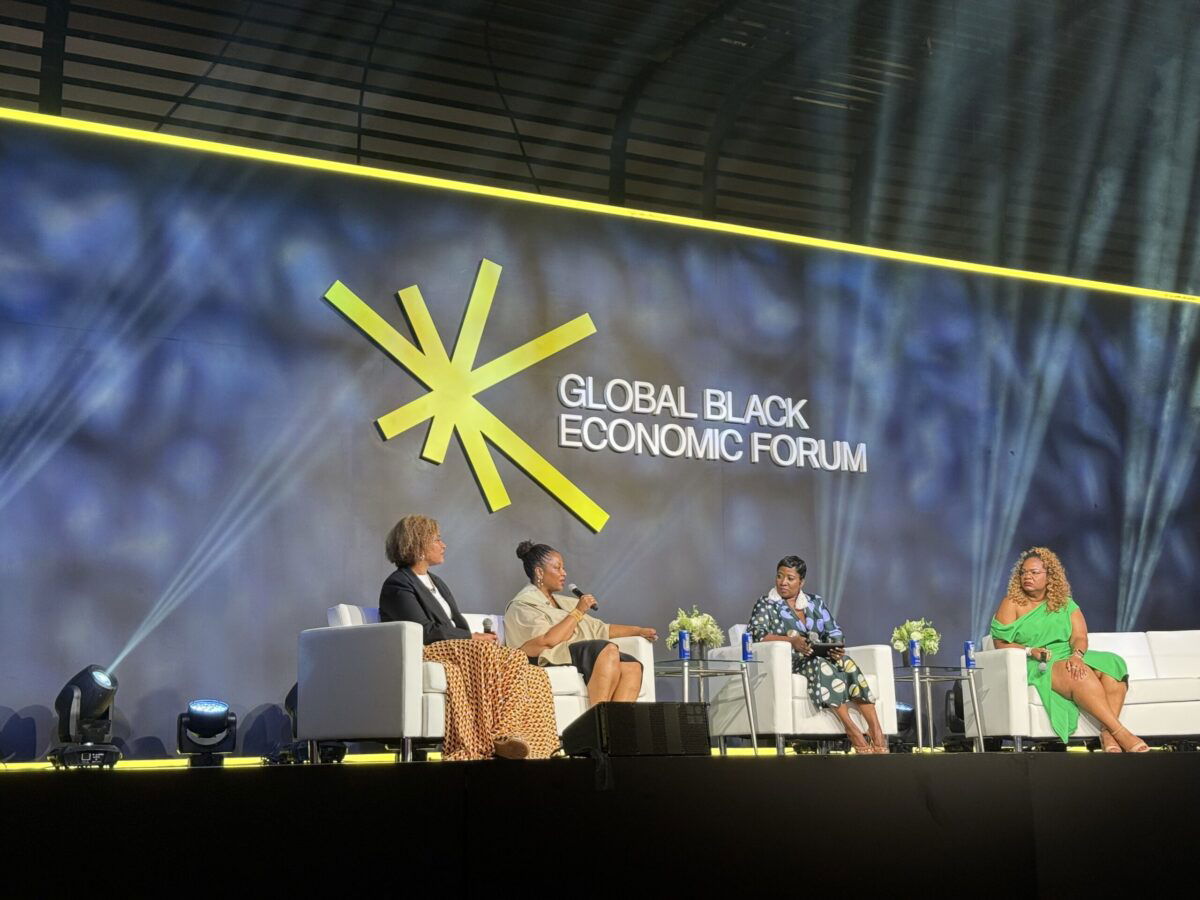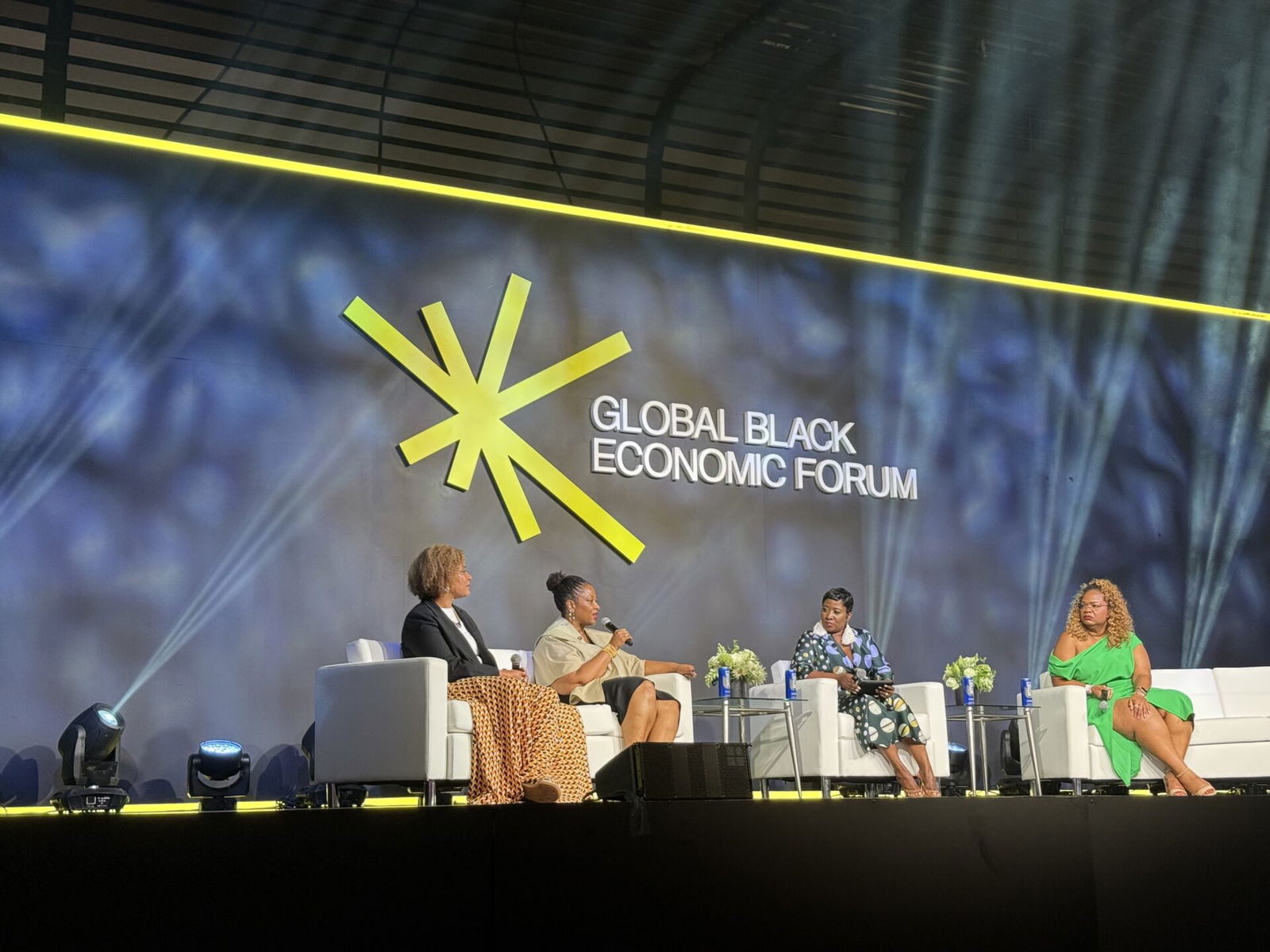In a world being rapidly reshaped by artificial intelligence, political rollbacks, and widening wage gaps, a dynamic panel of Black women leaders gathered at the 2025 Essence Festival of Culture to issue a powerful call to action: the future of work is already here, and Black communities can’t afford to be left behind.
At the Black Global Economic Forum’s session titled “Work, Wealth, and the Workforce of Tomorrow: Innovation, Unions, and Black Economic Mobility,” Ebony McMorris, AURN White House correspondent, guided a potent conversation featuring SEIU President April Verrett, ACLU President Deborah Archer, and National Women’s Law Center President and CEO Fatima Goss Graves. Together, they spoke truth to power about systems that profit from Black labor while denying Black workers fair access to opportunity, equity, and decision-making.
McMorris set the tone with hard facts: 43% of Black workers are concentrated in just three sectors: healthcare, retail, and public administration. All three are currently facing pressure from automation, underinvestment, and policy disruption. Meanwhile, Black workers make up less than 9% of STEM professionals and only 6% of apprenticeships. Still, the panel’s energy was not rooted in defeat; instead, it radiated strategy and resolve.
“AI is not going to replace our humanity,” said Verrett. “There will never be an instance where our humanity will be able to be replaced by automation. We have to remember to center our humanity and to let the powers that be remember we are talking about lives, which cannot ever be replaced.”
Verrett, who leads one of the nation’s largest labor unions, was clear: collective power is essential to unlocking Black economic mobility.
“Jobs that are poverty-wage jobs today can become family-sustaining jobs tomorrow if those workers organize,” she said. “When home care workers—the fastest-growing workforce in our economy—come together, they create new pathways to the middle class for millions of Black families.”
Goss Graves also highlighted the importance of care work (often undervalued and underpaid) as a space where innovation rooted in equity can make a real difference.
“There are jobs AI won’t replace—like care work that requires touch, empathy, and human connection,” she said. “But technology can also improve those jobs. It can help enforce fair pay, eliminate wage theft, and ensure better job matching. That only happens if we center equity from the beginning.”
The conversation turned to the increasing threats Black workers face, including anti-DEI legislation, as well as restrictions on protest rights and civil liberties.
“These aren’t isolated threats—they are connected,” Archer said. “It’s about the re-ascendency of white supremacy. We cannot silo our fights—whether it’s over education, employment, voting, or housing. These issues are intertwined. And so is our resistance.”
She called for a renewed focus on community infrastructure, civil rights tools, and long-term grassroots organizing.
“We’re not going to litigate our way out of this crisis,” Archer said. “We have to build power in our communities, with coalitions ready to take on structural inequality in every form and use tools that are not the standard tools that we’ve used in the past.”
The panel didn’t hesitate to name private-sector responsibility either.
“We flocked to federal and city jobs because the private sector wouldn’t hire us,” Verrett said. “Those public sector jobs—many of which are being cut—gave us retirement, stability, and healthcare. Corporations need to be held accountable for not hiring us and not paying us what we are worth. It is time to say, ‘No more poverty-pushing.’”
Near the end, all three issued a resounding call to action.
“Justice and equality are not self-executing,” Archer reminded the audience. “They exist where we fight for them, and now is the time to fight.”
Verrett closed on a note of generational power.
“To the 92%, to the 80%, we have rested, we have rejuvenated. Now it is time for us to flex our power and muscle in ways that we choose with our joy and love at the center. This is our country, and it is worth us fighting for.”
What’s Next for Black Labor Power
Post panel, April Verrett spoke with BLACK ENTERPRISE about the surge in labor activism and what Black workers can learn from recent gains.
“The surge is real,” Verrett told BE. “We’ve seen growth in worker organizing that we haven’t witnessed in a generation. But now is not the time to take our foot off the gas —it’s time to put our foot on the gas.”
Drawing on union wins across Hollywood, tech, and service sectors, she offered it as proof that Black labor can deliver meaningful change.
“There is no healthy democracy on this globe without a healthy labor movement,” Verrett said. “In this moment, building worker organization, building off this momentum is the most important thing any of us can do around the hope of our democracy and economy.”
On resilience in the face of constant challenge, she offered this insight:
“I’m good at compartmentalizing—that works for me,” she said. “But we all have to heal while we do the work. We carry trauma. We carry weight. But we have to turn our pain into power.”
RELATED CONTENT: New Report Reveals Alarming Rise In Black Women’s Unemployment



